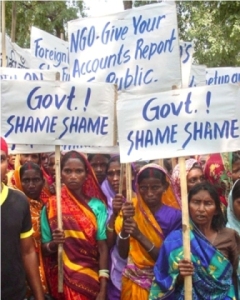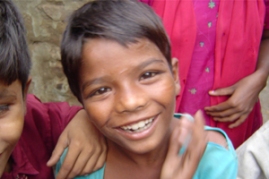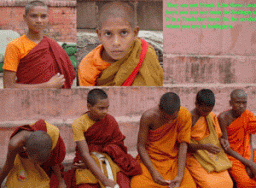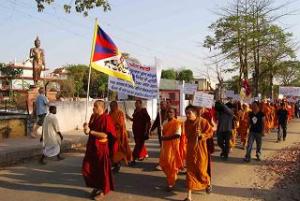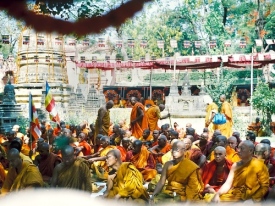CORRUPTION OF BODHGAYA TEMPLE COMMITTEE
” BODHGAYA MONKS ARE BUSY TO GARB MONEY FROM DEVOTEES, SEX WITH DEVOTEES & LOCAL SEX WORKERS AND DRINKING WINE AT NIGHT IS THERE MOTTO ”
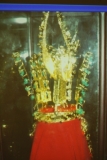 Who ever sit in the chair of the Secretary of Bodhgaya Temple Management Committee since 1975 they are all involved in corruption according to the locals. This corruption started when the Japanese and the Thai’s pouring money like water in the Holy Temple. Look at the left and right side photo of the thrown and ornaments which was found from Ex-Chief priest but with out checking by any expert BTMC deposited in the govt. treasury. There are five ways of corruption which was happening in the temple. They are as follows :
Who ever sit in the chair of the Secretary of Bodhgaya Temple Management Committee since 1975 they are all involved in corruption according to the locals. This corruption started when the Japanese and the Thai’s pouring money like water in the Holy Temple. Look at the left and right side photo of the thrown and ornaments which was found from Ex-Chief priest but with out checking by any expert BTMC deposited in the govt. treasury. There are five ways of corruption which was happening in the temple. They are as follows :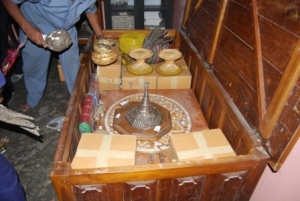
1. At the time of giving “Donation”. Because the devotees never asked the donation slip from the officer and as soon as they left the office took the money in his pocket in the past time. Even when the donation box of the temple used to open time to time at that time some part of the money goes to the pocket of the officer in the past time but now not possible because video graph is going on till the end of counting money but in the past years no photography done.
2. When the devotees are asking for Holy cloths. The offering money for the cloth goes to the pocket of the officer which the devotees never came to know. The monks have their special group as well as special friends. But now this kind of corruption is minor.
3. When the devotees are offering to decorate the temple. The commission goes to the pocket of the officer from the dealer. Still commission activity is ( under table ) going on. This kind of work not possible to stop in India.
4. When the devotees are offering “ Sangha Dana”. The false bill goes to the pocket of the organizer.
5. The most horrible of all is asking for Holy Bodhi Tree Wood, leaves and idols by the ignorant & crazy devotees from the Buddhist world. It is a million dollars business by the officers and the monks. It was happening in the past but from 2007 it is not possible.
Many donated jewellery is missing whose account no body knows, until or unless the devotees from around the world came forward to ask for the accountability then only the government can reach to the point. The Government has no information about the Temple wealth. Intensive interrogation to all the past secretary and monk in charge of Mahabodhi temple can only revel the truth. When the temple management committee will register his complain and when the police will take action that God only knows. You watch the audit report very carefully. See the telephone bills, entertainment bill, miscellaneous bills, repair bills and Buddha Jainti calibration bills and then you will revile the story. ( soon i will upload the past bills )
NGO’S … NGO’S ….. NGO’S
All the NGO’s in Bodhgaya registered themselves at Patna or in Delhi or some other state to work in Bodhgaya. Many NGO’s are there those who registered in the name of Gaya or Dobhi or Charki ( 20 Kilometers from Bodhgaya ).
PLACE WISE NGO’s IN BODHGAYA TOWN
Amwa 01 Nos.
Baiju Bigha 02 ”
Bakrour 15 ”
Bhagalpur 16 ”
Bodhgaya 28 ”
Dumuhan 08 ”
Kendue 03 ”
Mastipur 16 ”
Miya Bigha 04 ”
Mocharim 02 ”
Pachatti 10 ”
Rampur 02 ”
RajaPur 02 ”
Tikka Bigha 03 ”
Near To Bodhgaya Town
Atri 04 ”
Charki 01 ”
Dobhi 01 ”
GayaTown 82 ”
Itra 03 ”
Manpur 03 ”
Pararia 02 ”
Sheikhwara 01 ”
BODHGAYA – 4.05.2008
200 NGO’s of Bodhgaya is now facing the biggest problem in their life to exist in Bodhgaya in the name of Social Service. It is a corruption of $ 70 million. Many foreigners never complain to Government because they received life threat from the locals as they said. They are always in local media by providing the reporter under table from the beginning for their so-called social service. They are spending the donated money for their own entertainment but all the bills go to NGO’s audit with the help of local auditor. There are some big cats that the local authority never dares to touch them for their political & money power. But only the past Commissioner of Magadh Division Dr. Ramaiah takes the sleep of these so called NGO’s of Bodhgaya by issuing them notice to present at his office on dated 16.04.2008 with all the documents. Those people did not present on that day they have to present again on dated 16.05.2008 at his office. He is the most honest officer and for his honesty the local people came forward ( Mainly the Downtrodden ) to complained against these so called NGO’s of Bodhgaya. He is personally raiding to every single NGO’s office and for that many seasonal NGO’s shutdown their so-called office, local auditors are afraid, political power shut their mouth. He issued notice to :-
BodhGaya Temple Management Committee – Bodhgaya
Mahabodhi Society ofIndia – Bodhgaya
Samanway Ashram – Bodhgaya
Children and Development Trust – Bodhgaya
Association For Buddhist Circuit Development – Bodhgaya
Jeanamitav Welfare Trust – Pachatti
People First Charitable Trust – Pachatti
Indian Rural Development Trust – Pachatti
Kirwin Relief Trust – Pachatti
Buddha Guest House – Pachatti
Fortune of Children Welfare Guest House – Pachatti
Tara Helping Educational Society – Shakwara
Buddha Handicap Development Society – Dandawa
School of the world – Baiju Bigha
Vajrabodhi Society – Mocharim
Muskan Vikalang Trust – Rampur
Amedkar Handicap Charitable Trust – MiyaBigha
Niranjana Public Welfare Trust – Bakrour
Sujata Children Welfare Foundation – Bakrour
Buddha Educational Foundation Society – Bakrour
Sakya Sujata Welfare Trust – Bakrour
Utkarsh Bharity – Bakrour
Avatar Human Educational Charitable Trust – Bakrour
Tathagat Sikhsan Sansthan Welfare Trust – Bakrour
Sujata Voluntary Society – Bakrour
Mini Ha Ha Trust – Katorwa
Privilege Sharing – Bhagalpur
Jeevan Deep – Bhagalpur
Rahul Meditation Charitable Trust – Mastipur
Nari Jagaran Munch – Mastipur
Buddha Vocational Charitable Trust – Mastipur
Avidya Vimukti Sansthan – Mastipur
Note : Only two among of these trust are really working well. If you are supporting any NGO in Bodhgaya then don’t think that you are helping the right one.
Corruption by the Children
The small children of Bodhgaya called the tourist as a “ Client ”. You will see them at Sujata Garh after the crossing the river as well as in Bodhgaya. They will tell you “ Hi – friends, No – father – No mother give me a dollar ”. They know how to cheat you. If you give them school material then as soon as you left them they will sale it to the same shop keeper and money will be distribute among them. They will take your E-mail ID and will sent you mail like “ their family is suffering from this or that OR my house destroy by cyclone OR my school fees not yet deposited and if I don’t pay it then school will kick out me……..etc.” They used the theories which create compassion in the heart of people and out of it they earn huge money.
The local downtrodden parents are also involved in this business along with some NGO’s. Both are using these children to gain money. They received percentage from the NGO’s when they brought client to them. The famous cheater is a small boy looking like a cookie who known as Vikram ( 30 sponsor). He is the Boss of one Gang. They are always moving to catch the tourist from main temple to Thai temple and other group at river site. These children are not poor; it is a business in Bodhgaya.
Bodhgaya needed foreigners to complain the District Magistrate of Gaya regarding this issue then some thing can be happened at Bodhgaya. Will you come forward about it !!?
Corruption of Monasteries in Bodhgaya
There is a word called “Give & Take” and it is going on in every part of the world. Our Bodhgaya, the land of Buddha also affected by it. The devotees are the root cause of corruption and they forgot their duties because of their psycho blindness about the monks.
Every thing starts with a small hole and slowly it became a big hole. There is no true “Sangha” which monitor the activity of the monks because most of the so-called big monks are busy with worldly things which the beginner learnt from the senior monks and now it is uncontrolled. The following methods are used by the monks :-
( A ) They do photography of downtrodden people and then all these photos showed in their respected country to collect money and how much money collected that God only knows.
( B ) When they purchase land to build a monastery at that very time huge money eaten by the dealing monk.
( C ) What ever they purchase for the monasteries they took commission from the shop keeper. These shop keepers provides false bill at the time of audit report.
( D ) The donations which they received from the devotees they did not show all in their audit report. Why they are not publishing audit report in the news paper like Ram Krishna Mission ? why they do not do press conference with the media ?
( E ) They take room rent from the devotees but in the bill they showed it as a donation. The devotees never asked why they are not writing room rent. Most of the devotees never insist for the bill, because monks are from their own country.
( F ) They used to show that they are doing social work and some of them are running school, these schools are not registered in any Government office. The bill is heavy at end of the year so the question is how many 1st Class student they produce in Bodhgaya ? How many doctors OR engineers they produce in Bodhgaya ? Is there any one who is studying at IIT or IIM !!?
( G ) They give bribes to the government officer to pass off their illegal request and at the end the bill shows heavy amount. The question is why giving bribes ? Is it a Buddha teaching ?
Dear brother & sister I am not against of any one but my motto is to educate the devotees and the monks to take the real path of Lord Buddha. In Denmark people stop giving donation to a Tibetan Monastery for their huge corruption. In California, USA huge corruption is going on in most of the monastery as it is happening in Varanasi-India. The most pathetic story in Bodhgaya is most south-east Asian monasteries are telling that “Indians are not allowed ”. Good & Bad is every where it does not mean that we should not talk about Bodhgaya and we should not rectify ourselves. The yearly Puja Committee at Bodhgaya by different sects at recent years are the biggest corruption place. Now this yearly puja is a show up business like our Hindus.
Temple Wise Room Accommodation in Bodhgaya
Name of the Temple Phone No. No. of Rooms
Asian Buddhist Cultural Center 2200478 07 Rooms
Bhutan Temple 2200710 25 Rooms
Burmese Temple 2200721 80 Rooms
Chinese Temple 2200769 50 Rooms
Daijokyo Buddhist Temple 2200747 45 Rooms
Dhambodhi Meditation Center 2200740 20 Rooms
International Meditation Center 2200707 30 Rooms
Japanese Temple 2200743 25 Rooms
Karmapa Temple ( Tibet ) 2200795 20 Rooms
Korean Temple 2200512 10 Rooms
Mahabodhi Society of India 2200742 16 Rooms
Maitriya Project 2200620 20 Rooms
Nepal Temple 2200802 25 Rooms
Nigma Temple ………………10,000 Person can sleep on the floor
Root Institute of Wisdom Culture 2200714 25 Rooms
Royal Thai Temple 2200476 80 Rooms
Shechen Monastery ( Near SBI Bank ) 2200650 100 Rooms
Sikim Guest House 2201130 16 Rooms
Taiwan Temple 2200503 35 Rooms
Tibetan Temple 2200722 100 Rooms
Vietnam Temple ( Near Kalchakra ) 2200733 30 Rooms
Note :–
I am giving two years old data to make you understand that at present what is their position which you can have a look. Do they give professional hotel tax ? A monastery should run what ever they received from the local community. A monk should not think about food and about tomorrow. Where is Dhamma that God only knows ?
KEEP IN MIND WHEN YOU ARE IN BODHGAYA
“ Hello Friends, Hi-Friends, No-Father, No-Mother is the symbol of corruption in Bodhgaya.”
“ Talking about Charity means the symbol of corruption may be they are X, Y, Z .”
“ 99 % Hotel and Guest House in Bodhgaya have direct or indirect link with so-called NGO business which is leading towards a huge corruption.”
“ Be careful of so called Monks in BODHGAYA. They are busy with all worldly things. What the prophets left from their home, today’s monks are busy with that luxury. Come at summer time you will see the colour of a monk. GARBING MONEY FROM DEVOTEES, SEX WITH DEVOTEES, DRINKING WINE IS THERE MOTTO ”
“ All the spiritual courses at the time of winter and rest of the year where are they that God only knows. Every Holy place in the world is full of local believers and only in bodhgaya it is opposite – Why ?? ”
“ If you tell the truth to a devotee about the corruption then he / she will never believe that, until or unless cheated at Bodhgaya.”
“ Be careful of dramatic performance, sophisticated words and the e-mails from the cheaters otherwise your emotion will go to hell.”
“ Never try to buy a piece Land in Bodhgaya. Land Mafia will take you to hell. You have to pay 100 times more then the original rate. No out sider can buy land in India by his / her name but any organization can buy land in his / her name. Any one can be secretary or president of an NGO in India and can keep all power in his / her hand but he / she can not be Settler ( means founder ) as per law of India.” To cheat a donar the local boys / people have understanding with local lawyers and that is why all the doners at Bodhgaya knows that they can not be secretaty or president of an NGO in India which is a white lie “.
“ Marring a foreign girls is a kind of profession in Bodhgaya and the horrible end of the love story is happiness depends on money. The foreign girls thought that boy is the best boy in the world and the right partner for life. Please just say that ” I will stay in India and I will hand over my passport to Indian government and I will never go back to my country. The Horrible truth will be known to the lady. ”
“ Be careful from the cheater when you are in Varanasi, Taj-Mahal, Jaipur, Khajuraho, Goa otherwise you will go to hell. Their sympathetic word, help is the root cause of all problems.”
“ Call to this No. 91- 8083339782 or arupteresa@gmail.com for any help when you are cheated or receiving any kind of threat by any one in Bodhgaya.”
“ Please stop giving cash any ways and means to any one to stop corruption in Bodhgaya. Give them food but not money. The local downtrodden became lazy and a kind of beggar because of this money. Come forward to build a new Bodhgaya.”

